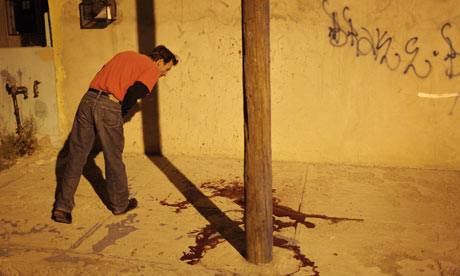Subject: US/UN: In drug war, failed old ideas never die
AlertNet
www.alertnet.org
26 February 2010
COLUMN
In drug war, failed old ideas never die: Bernd Debusmann
Source: Reuters
(Bernd Debusmann is a Reuters columnist. The opinions expressed are his own)
By Bernd Debusmann
WASHINGTON, Feb 26 (Reuters) - Here's a stern warning to the U.S. states of Alaska, California, Colorado, Hawaii, Maine, Michigan, Montana, Nevada, New Jersey, New Mexico, Oregon, Rhode Island, Vermont and Washington. A United Nations body is displeased with your liberal medical marijuana laws. Very displeased.
The U.N. rarely takes issue with the internal affairs of member states, and even less with those of the United States. But that's what the International Narcotics Control Board has just done in its latest annual report, published this week. Without mentioning by name the 14 American states where marijuana is legal for medical purposes, the 149-page report says:
"While the consumption and cultivation of cannabis, except for scientific purposes, are illegal activities according to federal law in the United States, several states have enacted laws that provide for the 'medical use' of cannabis. The control measures applied in those states for the cultivation of cannabis plants and the production, distribution and use fall short of the control requirements laid down in the 1961 Convention (on narcotic drugs.)
"The Board is deeply concerned that those insufficient control provisions have contributed substantially to the increase in illicit cultivation and abuse of cannabis in the United States. In addition, that development sends a wrong message to other countries." The Board's concern doesn't end here. It is equally worried over "the ongoing discussion in several states on legalizing and taxing the 'recreational'
use of cannabis."
California, the most populous state in the U.S., stands out in that discussion. In mid-February, a California legislator, Tom Ammiamo, introduced a bill that would tax and regulate marijuana (by most estimates the state's largest cash crop by far) much in the same way as alcohol. In addition, California backers of marijuana legalization say they have collected more than 700,000 signatures for a ballot initiative likely to be voted on in November.
There's not the slightest hint in the U.N. report of rapidly growing support for more liberal laws on marijuana, the world's most widely-used illicit drug. The latest U.S. poll on the issue, in January, showed that eight out of ten Americans support legalizing marijuana for medical use and nearly half are in favor of legalizing the drug, in small quantities for personal use, altogether.
Countries that have done that come in for harsh rebuke from the Control Board, which singles out Mexico, Argentina and Brazil for having sent "the wrong message" by passing legislation that takes the crime out of drug use and replaces prison sentences with treatment and education programs.
U.N. OVERSTEPS THE MARK
In the eyes of two liberal think tanks, the Washington Office on Latin America and the Transnational Institute, lecturing the U.S., Mexico, Argentina and Brazil on the way they handle drug use are way off the mark. The rebuke, said a joint statement by the two groups, "clearly oversteps the INCB's mandate and constitutes unwarranted intrusion into these country's sovereign decision-making."
The 1961 Single Convention on Narcotic Drugs placed marijuana in the most restrictive category, alongside heroin (as does the U.S. federal
government) and for years was seen as a major obstacle to domestic reform in signatory countries. But a follow-up treaty in 1988 provided a measure of flexibility on whether or not drug possession should be treated as a criminal offence.
In the United States, for decades the spiritual home of rigid marijuana prohibitionists, President Barack Obama's attorney general, Eric Holder, last October issued new policy guidelines that marked a milestone in a long-running dispute over whether federal law trumps state law on matters of marijuana. Holder announced that the Justice Department would stop raiding medical marijuana facilities set up under state law.
That was the most high-profile move on drug policy so far in the presidency of Obama, who is on record saying that "the war on drugs has been an utter failure. We need to rethink and decriminalize our marijuana laws..." He made the remark in 2004, when he was running for a seat in the U.S. senate. Speaking about drug policies as a whole, not only on marijuana, as a presidential candidate, Obama said he believed in "shifting the paradigm, shifting the model so that we can focus more on the public health approach."
In the long-running global dispute over drug strategy, that means treating addicts not as criminals but as patients who deserve care in a public health system. To hear Obama's drug czar, former Seattle police chief Gil Kerlikowski, tell it, that shift is underway. But is it really?
The answer is no, judging from just-released highlights of the national drug control budget for Fiscal Year 2011, which begins in October. It provides for $15.5 billion in overall spending, a 3.5 percent increase over 2010, and allots vastly more money to law enforcement ($ 9.9
billion) than to addiction treatment and preventive measures ($5.6 billion).
Like drug control budgets under President George W. Bush, the figures do not include the vast cost of arresting drug offenders and putting them behind bars, a practice that has helped turn the United States into the world's biggest jailer. Factoring in those costs would show that 73 percent of overall spending goes to law enforcement and controlling the supply of drugs, according to John Walsh, a senior expert at WOLA.
Aaron Houston, director of government relations at the Marijuana Policy Project, sees the budget as evidence of recycled Bush policies rather than the paradigm shift Obama promised.
It's Bush wine in Obama bottles. (You can contact the author at
Debusmann@Reuters.com)
--
Drugs & Democracy Programme
Transnational Institute (TNI)
De Wittenstraat 25 | 1052 AK Amsterdam (The Netherlands)
Tel +31-20-6626608 | Fax +31-20-6757176
Email drugs@tni.org
http://www.tni.org/drugs/
_______________________________________________
Dd-world mailing list
https://lists.tni.org/mailman/listinfo/dd-world





